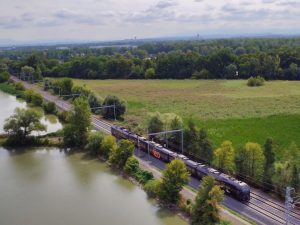 ALLRAIL, CER, ERFA, UIP and UIRR have sent a joint letter to the European Commission calling for concrete measures to face the COVID‐19 pandemic and its economic consequences.
ALLRAIL, CER, ERFA, UIP and UIRR have sent a joint letter to the European Commission calling for concrete measures to face the COVID‐19 pandemic and its economic consequences.
The letter was sent to Margrethe Vestager, the EC Executive Vice President, Adina Vălean, the Commissioner for Transport and to Elisa Ferreira, the Commissioner for Cohesion and Reforms.
“As for all other sectors of the economy, the COVID‐19 crisis hit European railways, combined transport and wagon load operators, wagon keepers, workshops and mobile services in a sudden and dramatic way, and the extent of its final impact will be great. We call on the European Union as well as the Member States to ensure that railway companies, combined transport and wagon load operators, wagon keepers, workshops and mobile services can successfully continue their business activities during as well as after the crisis and we commit all our efforts in this same direction,” the associations say in their joint letter.
While the European rail freight companies are offering concrete solutions to maintain consumer goods supplies running, with a special focus on food supplies, health supplies and medicines, despite the very sharp drop in demand, passenger operators still provide services wherever possible, albeit in a reduced manner. Infrastructure managers are doing their best to enable all operators to deliver their services.
At the same time, the rail sector is suffering from the containment measures taken by Member States to fight the spread of the pandemic and from the consequent huge drop of the mobility demand.
 The international passenger traffic is almost at a standstill due to the closure of intra‐EU borders. At national level, passenger traffic is reduced, in some countries by more than 90%. Both business and leisure booking activity has decreased to almost zero, the letter says.
The international passenger traffic is almost at a standstill due to the closure of intra‐EU borders. At national level, passenger traffic is reduced, in some countries by more than 90%. Both business and leisure booking activity has decreased to almost zero, the letter says.
In spite of the challenging framework conditions, vital rail freight flows continued within Member States and across Europe, demonstrating that rail freight is a strategic asset in keeping freight moving. Difficulties and a significant drop in the services between Europe and China will have further negative impact on rail freight operators.
The European rail and intermodal sectors are facing huge economic and operational difficulties and a significant drop in the services between Europe and China will have further negative impact on rail freight operators. The infrastructure managers will also suffer if less services will run on rail lines and the liquidity provided by track access charge revenues will be cut proportionally to the reduction of traffic.
“The State aid Temporary Framework recently adopted by the European Commission is most welcome, and Member States’ authorities should make the widest possible use of it. We
particularly appreciate the readiness of the Commission to take action – something that enabled Member States to already take initiatives under the said Framework. We hope that the Member States will adhere to this requirement without exception and ensure that all companies in the railway sector will receive fair and adequate support vis‐à‐vis other transport modes,” the letter says.
As it has already been confirmed by the Commission, the COVID‐19 crisis can be considered as an exceptional circumstance which allows Member States to adopt aid measures
in order to compensate undertakings for damages suffered due to and directly caused by the outbreak. Thus, “it is clear that Member States can adopt aid measures according to Article 107(2)(b) TFEU in order to support rail operators, which run open access passenger services and freight transport services.”
Regarding public transport operators who provide services under public service obligation (PSO) contracts, they have also reduced the services due to the virus crisis and, therefore, the MS should take measures aimed at covering the losses of public service operators and at safeguarding the economic equilibrium of the contracts.
“We would welcome if the Commission could explicitly confirm that Member States may allocate necessary additional resources in the context of the PSO contracts without asking for the prior authorisation of the Commission. In addition, aid schemes should be horizontal & sectorial, and need to include service providers associated within the transport sector, such as ticket vendors, catering companies, station managers and freight,” the five associations conclude.
Share on:



